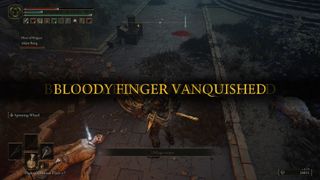
No matter what most supposedly 'hardcore' Souls players will tell you, cooperation is a core part of FromSoftware's games. In the first Dark Souls, Knight Solaire was there to speak about the virtues of lending a helping hand, a not-so-subtle "Hey, you can go get help for this". While Elden Ring's multiplayer is still an arcane ritual of secrets, it is a lot more forgiving, but that has come with some trade-offs.
During an early trip to the Roundtable Hold, I discovered that you can purchase a blue cipher ring that lets you volunteer to be summoned by a host wearing the corresponding white cipher ring, defending them from an invader. Eager as I am to aid others in these games, I purchased and activated it immediately. What fun this will be, I thought to myself, fuelled by visions of daring rescues and last-minute saves. The reality leaves a little to be desired.

Most of the time you spawn so far from the host (and without an invader's ability to change spawn locations) that either the host is doomed as you struggle to recall what staircase connects that balcony to that courtyard, or they have already killed the invader themselves. Unless, of course, you're a cowardly, pyjama-wearing wizard, in which case you'll be blasting laser beams from afar. But for us mere mortal melee fighters, we have to get up close and personal, which can prove tricky.
Stacked odds
Even when I do reach the host, I often find them, plus a friend, already wailing on the invader with an assault of spells and melee power. So much of Elden Ring's multiplayer setup is stacked against invaders, who (unless a host uses a special item, a Taunter's Tongue, to allow it) can only invade hosts when they have a cooperative phantom summoned. They still can use the area's enemies against hosts and their allies, but being outnumbered by other players makes it difficult to get those kills.
When I show up to one of these fights, that Simpsons scene plays in my head: "Stop, stop! He's already dead!" You end up just kind of feeling sorry for the invaders. Sure, they're breaking into other games to cause mischief and mayhem, but it's such a hopeless endeavour, half the time I wonder what exactly I'm doing as a hunter. In Dark Souls 2, where this role originated, you were defending a lone host against invaders who were often far more experienced and bolder. Some were outright cruel. It felt nice to offer a helping hand to scared newbies who had no idea how to fight other enemies in general, never mind skilled players.

I still have the blue cipher ring active, but now when I arrive in a host's world, I wait to see if they're genuinely in trouble before I rush in. Those poor bloodthirsty schmucks deserve a break now and then. To feel like I'm actually helping, I now focus on Elden Ring's inhuman threats. While enemy players have been made less deadly, Elden Ring's bosses seem designed to keep all players on their toes.
A bad phantom isn't just a let-down, they're a liability,
Once upon a time you could spam your dodge to avoid oncoming attacks. Sure, it wouldn't work all the time, but it'd work often enough to see you through, especially if you had a phantom with you to land those hits. Still, summoning in help has never been an easy mode, not least because bosses get significant health buffs for each phantom present. Plus, summoning is a gamble. A bad phantom isn't just a let-down, they're a liability—if they don't help or die early then they've left the host alone with an even tougher boss to fight. Even with devastating spells, a phantom cooperator can still slip up and leave a host dealing with a furious boss while a massive laser stops them seeing anything happening on screen.
The biggest gaming news, reviews and hardware deals
Keep up to date with the most important stories and the best deals, as picked by the PC Gamer team.
Much of this is still true in Elden Ring, but building on the rhythms of previous bosses FromSoftware has also ensured that those in the Lands Between account for spam rolling in the timing of their moves. Now you'll often find yourself simply rolling right into an attack if you indulge in the time-honoured tradition of panicking and hitting that dodge button like you're trying to withstand torture from Revolver Ocelot. On top of that, their moves still have big, sweeping arcs designed to catch cheeky players circling around behind.

So having more people present doesn't always lead to an easy win. If anything, it can sometimes complicate a fight, turning a boss's flurry of attacks into an unpredictable storm as it careens to switch targets. Late game bosses have attacks that are barely readable unless you're up in their face, leaving cooperating players caught by painful area effects.
All of this is to say that beating a boss is merely the first step towards learning them well enough to go do the real task: getting someone else through the fight. It's never been harder. I've found myself helpless as I try to pull the boss's attention and dodge everything while laying on the hits, only for a reckless host to get caught in the random swing of a blade or fail to dodge a spell's wide blast. There's no way to communicate in a fight, so you're still relying on a player being good enough on their own to read the enemy and stay alive. All while the pressure is on to not embarrass yourself and die in the first 30 seconds.
Courtesy call
The worst insult to being a co-op partner isn't even the challenge: It's your host not bothering to gesture or acknowledge your presence. A little wave or a "hello" goes a long way. Whenever a host summons me in like I'm some NPC there to do their bidding, I have flashbacks to working service jobs for ungrateful customers.

Yet I always drop my summon sign several times after every boss fight, returning to old areas until I'm too high a level to be summoned by those tackling fights I've already won. I still have my blue cipher ring on, in case the moment ever comes when someone actually needs the help. Helping others is such a core part of these games to me, but Elden Ring has made actually being a useful phantom feel tougher than ever. At least for us sword-wielders—wizards are probably going full god mode on anything that stands still for the ten seconds it takes to cast the beam of death.
Every summon is a chance to be someone's mentor, showing them what's possible and training them to do it themselves.
The moment, however, when you finally nudge someone over the finish line after several attempts? That's what keeps me coming back. It's why I put up with all the challenges and nuisances mentioned above. You can see them learning and growing while you help them. Every summon is a chance to be someone's mentor, showing them what's possible and training them to do it themselves. Even spell casters with end-game spells and ludicrous damage output are showing what awaits dedicated players, even if they turn boss fights from gruelling crucibles into pleasant light shows that last a mere thirty seconds. I can imagine low-level players learning it's possible to decimate bosses so easily feels like glimpsing the divine.
As a co-op partner, I've had to up my game because knowing you did a little virtual good deed is the most precious thing these games have to offer. Especially for melee players, where you're coaching them one attempt at a time on how to avoid traps or attack through a boss's swing. Wizards have it easier, but they sometimes end up just killing the boss for the host rather than teaching them how to overcome a challenge, failing to leave them with lessons they can apply to future battles. Some players will want that kind of help, but I'm always grateful to be shown a new technique or the right timing—something that feels within my grasp.
I might bin the blue cipher ring, though. Invaders have it bad enough without me coming to kick their arse.
Most Popular


